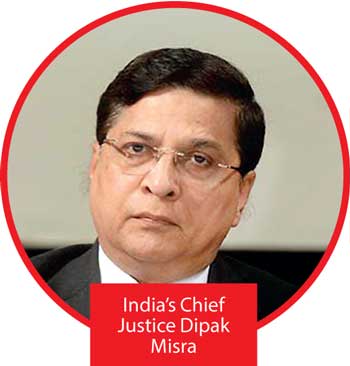Reply To:
Name - Reply Comment
Last Updated : 2024-04-19 19:07:00
Impeachment against India’s CJ indicates the need for judicial reforms
 The dawn of 2018 saw the opening a new can of worms in India; namely, the issue of corruption and politicization afflicting the higher judiciary, including the Supreme Court.
The dawn of 2018 saw the opening a new can of worms in India; namely, the issue of corruption and politicization afflicting the higher judiciary, including the Supreme Court.
On January 11, four senior Judges of the Supreme Court, Jasti Chelameswar, Ranjan Gogoi, M. B. Lokur and Kurien Joseph, suddenly addressed the media on the sordid state of affairs in the court which, if not attended to immediately, could lead to the collapse of democracy in the country, they warned.
The revolt was against Chief Justice Dipak Misra, who was accused of mishandling a matter relating to a former judge who had allegedly offered to bribe Supreme Court judges in a case Misra himself was presiding over.
Misra was not accused of taking bribes but was criticized for repeatedly intervening to ensure that only judges of his choice could hear the matter.
“One case cited by the four protesting Judges was a request for an independent investigation into the death of a Central Bureau of Investigation (CBI) court judge, B. H. Loya, who was overseeing a case involving murder allegations against Amit Shah, President of the ruling Bharatiya Janata Party (BJP),” The Guardian reported. “Media reports had raised suspicions over Loya’s death and the possibility of Shah’s involvement though a court had cleared Shah’s name,” the paper said.
The letter to Chief Justice Misra, which the four protesting judges released to the media, said:
“There have been instances where cases having far-reaching consequences for the nation and the institution had been assigned by the Chief Justice of this court selectively to the benches of their preference without any rationale for this assignment. This must be guarded against at all costs.”
Asked by journalists if the Chief Justice should be impeached, judge Chelameswar said: “Let the nation decide that.” And he closed the dramatic press conference by saying: “We don’t want wise men saying 20 years from now that justice Chelameswar, Gogoi, Lokur and Kurian Joseph sold their souls and didn’t do the right thing by our constitution.”
However, Misra claimed that, as Chief Justice, he has the right to decide the “roster” of Judges (the list of Judges who will hear a given case). But the protesting Judges said that this could not be a cover to manipulate the system for personal or political purposes and sought an overhaul of the system.
 Legal watchdog’s petition
Legal watchdog’s petition
Subsequently, Prashant Bhushan, a Supreme Court lawyer and Convener of “Campaign for Judicial Accountability and Reforms” filed a complaint in the court against Misra in the “medical college scam” case and requested five senior-most judges, including the four rebel judges, to hold an in-house inquiry into the matter.
Bhushan levelled the following charges against the Chief Justice in his complaint addressed to Justices J. Chelameswar, Ranjan Gogoi, Madan B. Lokur and Kurian Joseph:
The facts and circumstances relating to the Prasad Education Trust (Medical College) case show prima facie evidence suggesting that the Chief Justice of India (CJI) Misra may have been involved in the conspiracy of paying illegal gratification in the case, which at least warrants a thorough investigation.
M. Quddusi, a retired Judge of the Orissa High Court was arrested by the Central Bureau of Investigation (CBI) and later granted bail in this case. Prasad Education Trust was barred by the Medical Council of India from admitting students. The trust subsequently appealed to the Allahabad High Court and the Supreme Court.
Bhushan also questioned Chief Justice Misra’s denial of permission to the CBI to register a case against Justice Narayan Shukla of the Allahabad High Court in the Prasad Education Trust matter.
Bhushan’s second charge was the alleged misuse of administrative powers by Misra when he ignored the clear principle of ‘conflict of interest’ and proceeded with the hearing of a petition for an independent inquiry by a former Chief Justice of India into the irregularities in the Prasad Education Trust.
After hearing the petition himself, Misra nullified the order of another bench headed by Justice Chelameswar who had ordered the matter to be listed before five senior Judges of the Supreme Court. But the Chief Justice Misra constituted a three-Judge bench to hear the petition. The bench later dismissed the plea filed by Bhushan’s NGO, Campaign for Judicial Accountability and Reforms.
Bhushan also alleged that Justice Misra “conducted a serious act of forgery by ante-dating an administrative order dated 6 November 2017”.
The Supreme Court advocate also alleged that “Justice Misra, as a lawyer, acquired land for a fodder farm in Odisha by furnishing a false affidavit”. Later, the land deal was cancelled by a local Magistrate in 1985.
Bhushan’s 24-page complaint said: “The above-mentioned matters have tarnished the reputation of the court and have brought the judiciary into disrepute. It is a matter which needs to be swiftly dealt with.
The inquiry must be swiftly done so that the reputation of the judiciary is not damaged further and its integrity and independence remain intact.”
Move to impeach CJ
A month elapsed before further action was taken on the issue of cleaning up the highest rung of the judiciary. Sensing the growing unpopularity of the BJP government, following the BJP’s loses in crucial by-elections in populous North India, the opposition parties took up the issue.
Led by the two Communist parties, other opposition parties including the Congress, are on the verge of submitting an impeachment motion to the Chairman of the Upper House of parliament (Rajya Sabha) and India’s Vice President, Venkiah Naidu.
The draft impeachment motion as seen by The Citizen makes five charges against the Chief Justice. They are as follows:
1. The facts and circumstances relating to the Prasad Educational Trust case, show prima facie evidence suggesting that Chief Justice Dipak Misra may have been involved in the conspiracy of paying illegal gratification in the case, which at least warrants a thorough investigation.
2. That Chief Justice Misra allegedly dealt on the administrative as well as judicial side, with a writ petition which sought investigation into a matter in which he too was likely to fall within the scope of investigation since he had presided over every bench which had dealt with the case and passed orders in the case of Prasad Educational Trust, and thus violated the first principle of the Code of Conduct for Judges.
3. That the Chief Justice Misra appears to have antedated an administrative order dated 6th November 2017 which amounts to a serious act of forgery/fabrication.
4. That Chief Justice Misra allegedly acquired land when he was an advocate, by giving an affidavit that was reportedly found to be false and allegedly (despite the orders of the Additional District Magistrate cancelling the allotment in 1985), surrendered the said land only in 2012 after he was elevated to the Supreme Court.
5. That Chief Justice Dipak Misra has (allegedly) abused his administrative authority as master of the roster to (allegedly) arbitrarily assign individual cases of particular advocates in politically sensitive cases, to select judges in order to achieve a predetermined outcome (this is apparently the case about judge Loya’s death)
 It remains to be seen if the charges hold scrutiny, and whether the chairman of the Rajya Sabha, who is a hardcore BJP man, will admit the impeachment motion. Even if he admits, it has to be sent to a panel of three, including a judge of the Supreme Court, a Chief Justice of any High Court and a ‘distinguished jurist.’
It remains to be seen if the charges hold scrutiny, and whether the chairman of the Rajya Sabha, who is a hardcore BJP man, will admit the impeachment motion. Even if he admits, it has to be sent to a panel of three, including a judge of the Supreme Court, a Chief Justice of any High Court and a ‘distinguished jurist.’
Once the committee gives the green signal for impeachment, the impeachment motion will have to be carried by a two-thirds majority with at least 50% of the members of the two Houses of Parliament present and voting.
This is a tall order which also takes a long time. But time is short as Justice Misra retires in October this year on reaching 65.
At the moment the ruling BJP has the numbers in parliament to defeat the motion. But the movers of the motion argue that the impeachment debate is an opportunity to focus on the chronic ills of the judiciary and expose the sinister links between the BJP government and the higher judiciary.

Add comment
Comments will be edited (grammar, spelling and slang) and authorized at the discretion of Daily Mirror online. The website also has the right not to publish selected comments.
Reply To:
Name - Reply Comment
On March 26, a couple arriving from Thailand was arrested with 88 live animal
According to villagers from Naula-Moragolla out of 105 families 80 can afford
Is the situation in Sri Lanka so grim that locals harbour hope that they coul
A recent post on social media revealed that three purple-faced langurs near t